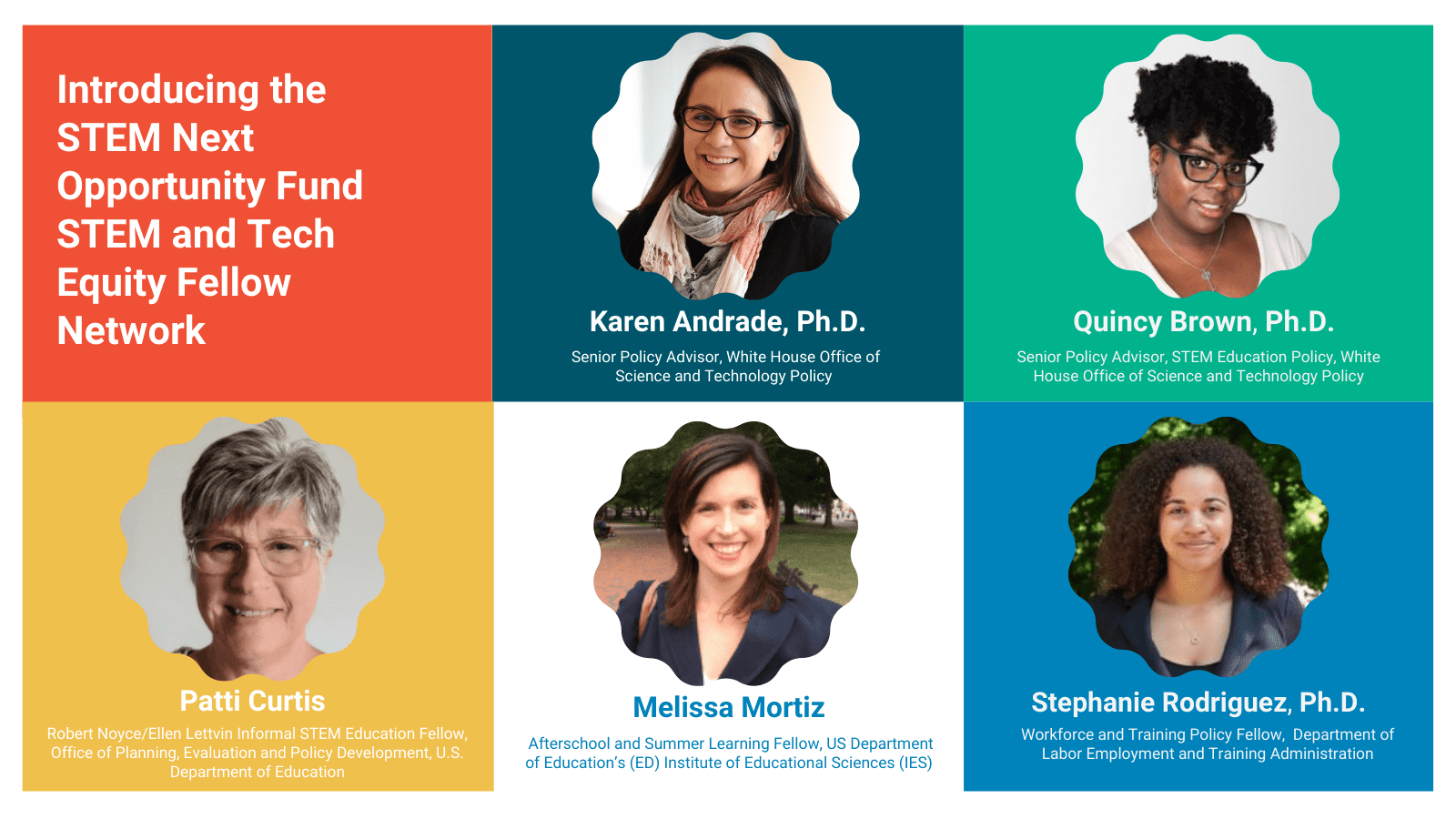Introducing the STEM Next Opportunity Fund STEM and Tech Equity Fellow Network

Each year, the Federal Government spends an estimated $3B on STEM education. In addition to this annual spend, recent initiatives championed by the Biden Administration offer the opportunity to usher in an historic wave of funding for STEM education. These include the American Rescue Plan (ARP), which allocates $122B to education, $39B for childcare funds, $1B to the Corporation of National and Community Service, and $600M to the National Science Foundation, and the potential infrastructure package. However, leveraging these existing funds and effectively tapping into new funding streams requires talent and capacity.
This historic influx of available resources will need historic capacity. To help agencies meet this capacity demand and ensure federal dollars are reaching as many communities as possible, the STEM Next Opportunity Fund launched the STEM and Tech Equity Fellow Network. The fellowship brings skilled experts into federal service to harness the power of the federal government and funding to expand access, quality and equity in STEM and Computer Science (CS). Following their fellowship, these individuals will bring federal policy expertise back to their communities and organizations to support scaling high quality STEM and CS programs and services.
The STEM and Tech Equity Fellow Network is focused on developing national leaders in STEM and tech equity who are skilled at using federal resources and are committed to moving the needle on key policy priority areas that have a tangible impact on students, educators and communities.
Meet STEM and Tech Equity Fellow Melissa Moritz
Since April 2021, Melissa Moritz has been serving as the Afterschool and Summer Learning Fellow placed at the Institute of Education Sciences (IES) in the U.S. Department of Education. Melissa brings a wealth of experience to the STEM and Tech Equity Fellow Network with prior experience at Teach For America and the National Math Science Initiative as well as serving as the Deputy Director of STEM at the U.S. Department of Education during the Obama-Biden Administration.
 Melissa began her fellowship right after the passage of ARP with the goal of supporting the successful implementation of the $2.4B set aside at the state level for out-of-school time learning in addition to supporting evidence-based programs to scale-up their efforts to match the demand from students and families.
Melissa began her fellowship right after the passage of ARP with the goal of supporting the successful implementation of the $2.4B set aside at the state level for out-of-school time learning in addition to supporting evidence-based programs to scale-up their efforts to match the demand from students and families.
“I am working to connect stakeholders in the afterschool and summer STEM learning space with the Department of Education so that resources are landing in an intended, strategic way. The fellowship has enabled me to add capacity to the Department and support the Secretary’s priorities and vision for education, which includes a focus on afterschool and summer learning, which are evidence-based strategies to support social, emotional and academic outcomes for students,” says Melissa.
The STEM and Tech Equity Fellowship ties together Melissa’s personal interests and professional expertise. As a former educator and as a mother of two, Melissa has witnessed firsthand the invaluable impact afterschool and summer learning programs have on kids.
“As a middle school science teacher at a community school in New York City, I saw the benefits that wrap-around supports offered to families. High-quality and affordable afterschool and summer learning programs were resources my students and their caregivers depended on. Now, as a parent myself, I feel even more strongly that every child, no matter where they live or what their circumstances are, should have access to these informal learning opportunities, which provide enriching and fundamental social and emotional development for kids,” explains Melissa.
During her fellowship with IES, Melissa is working to accumulate evidence on effective interventions in the informal STEM learning space and learn how to best leverage this moment in time to establish credibility in the field and enact sound policy.
“There are so many players working toward a common goal: Creating equitable, quality learning opportunities for students. But kids don’t experience learning in silos, so our efforts can’t exist in silos. Effective policy that changes kids’ lives will need to focus on creating connections across the learning experiences,” says Melissa. “Partnerships and collaboration are the key to moving forward.”

